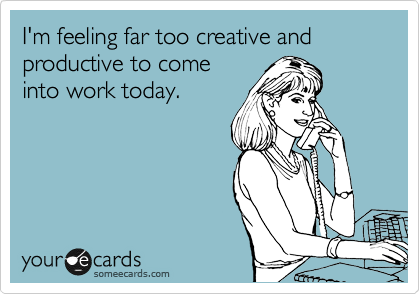It was a toss-up this morning between blogging about the new $10,000 Apple watch for work purposes, how distraction drives our creative genius, or a new "10 happiest jobs in America" survey that ranks school principal as America's happiest job. Hmm. I think I'll go with distracted genius today, because when this Gen Xer ponders school principals I think about Mr. Vernon from The Breakfast Club, who didn't seem all that happy in his work. It must be a generational thing?
So let's talk about the distracted creative genius lurking within us as we fail to filter out the vocal-fry affected co-worker who keeps going on and on (and on...) about her lazy boyfriend and her bichon frise!
A new Northwestern University study concludes that blocking out background click and clack at work can be harder for creative genius types, who tend to have a "leakier sensory gate," whatever that means. In response, these employees incorporate irrelevant elements from the office surround sound into the work at hand, and BOOM -- wow, how did you come up with that? It's brilliant! And I thought you couldn't focus on anything!
They riffed off the steady stream of background noise to open the floodgates to creative genius, that's what! The researchers posture that creative geniuses throughout history may have been imbued with leakier sensory gates:
Now new Northwestern University research suggests why the inability to shut out competing sensory information while focusing on the creative project at hand might have been so acute for geniuses such as Proust, Franz Kafka, Charles Darwin, Anton Chekhov and many others.The next time you get busted for daydreaming out the office window like your fourth grade teacher used to note in your report cards**, you can feel free to blame it on your leaky sensory gate. Your boss will be so confused by this brief explanation that you'll be left alone*** with your brilliant thoughts amid the background noise for the rest of the day!The Northwestern research provides the first physiological evidence that real-world creativity may be associated with a reduced ability to filter "irrelevant" sensory information.
The research suggests that some people are more affected by the daily bombardment of sensory information -- or have "leakier" sensory filters.
The contradictory downside? Employees with "leakier sensory gates" may feel the need the find more solitude at work. They may be itching to get away from background noise to "focus," when it's actually the background noise that's making their work more creative and ground-breaking. Perhaps today's open office environments aren't so terrible after all?**** (No, they're still terrible.)
** Now it makes sense why you always studied better with the television on for background noise, right?
*** In your dreams.
**** In a pinch, you might lead your leaky sensory gate down to the "quiet" corner coffee shop to work amid the whirring sounds of the coffee grinder and the stay-at-home mom group loudly comparing notes on their highly-gifted children at a nearby table.

ConversionConversion EmoticonEmoticon